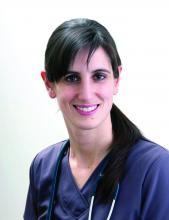In the program’s first year, 10 new physicians split into two groups for 2-hour sessions at an off-site meeting location once a quarter.
As much as early-career physicians need support, so, too, do future leaders.
When Andrea Khosropour, MD, first joined Oak Street in 2012, her mentor invested a lot of time in coaching her to become a better leader. For example, her mentor taught her the right way to have difficult conversations.
Dr. Khosropour, now a senior medical director who practices at the group’s Edgewater, Ill., location, said she finds balance at work because Oak Street gives her administrative time to attend to her management responsibilities. She also values the assistance of the medical scribes who document every patient encounter in the EHR. “That’s rare for primary care,” says Dr. Khosropour.
What qualities does Oak Street look for in its physician leaders? Dr. Myers said it starts with a physician who shares the group’s values, demonstrates clinical excellence and “scrappiness,” and has good intentions. He pointed out that Dr. Khosropour, who now oversees four practices, came to Oak Street with no experience running multiple practices.
Dr. Myers said Oak Street can grow its physicians internally as long as they share the group’s cultural values. “You can’t wait for people who already have those skills.”
Oak Street doesn’t rely on a fee-for-service model, in which physicians are paid by the volume of patients they treat. Specifically, that means 80% of its patients are in value-based contracts with private payers and the remaining patients are covered in the Medicare Shared Savings Program. About half of patients are dually eligible for Medicare and Medicaid, Dr. Myers said.
Because the group receives a set amount to manage the care of each of its attributed patients, Oak Street has the flexibility to invest in professional development, scribes, and other programs to support physicians, Dr. Myers said. That’s provided the group can successfully manage the care of their patients and keep them out of the hospital.
He advises practices that are more dependent on fee-for-service contracts to prioritize the following initiatives to prevent burnout: investing in professional development, reducing physicians’ administrative burdens, and celebrating physicians’ victories.
“Our goal is to provide the highest-quality health care employee experience possible. People will stay as long as you set that as a clear goal,” Dr. Myers said.


